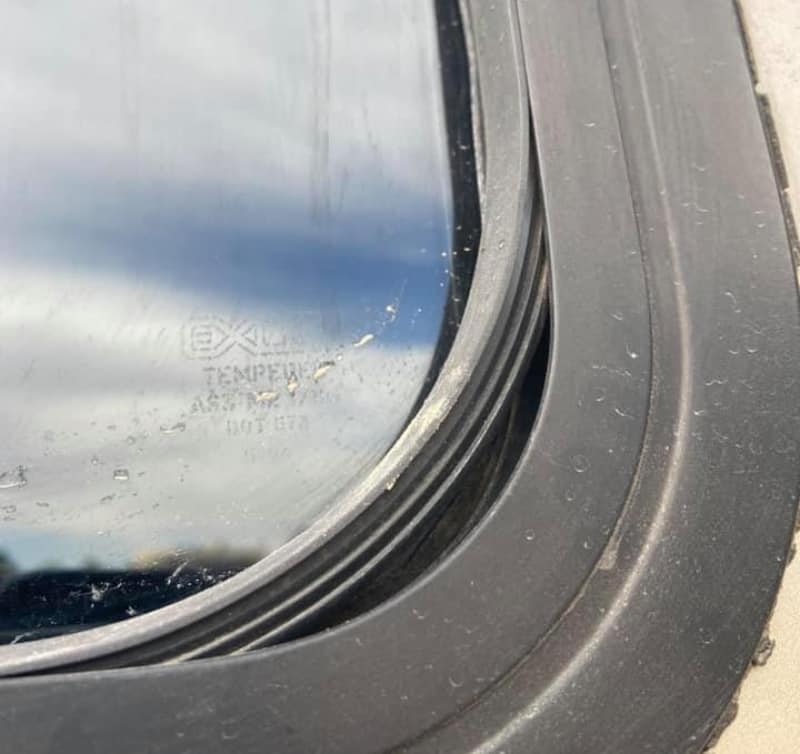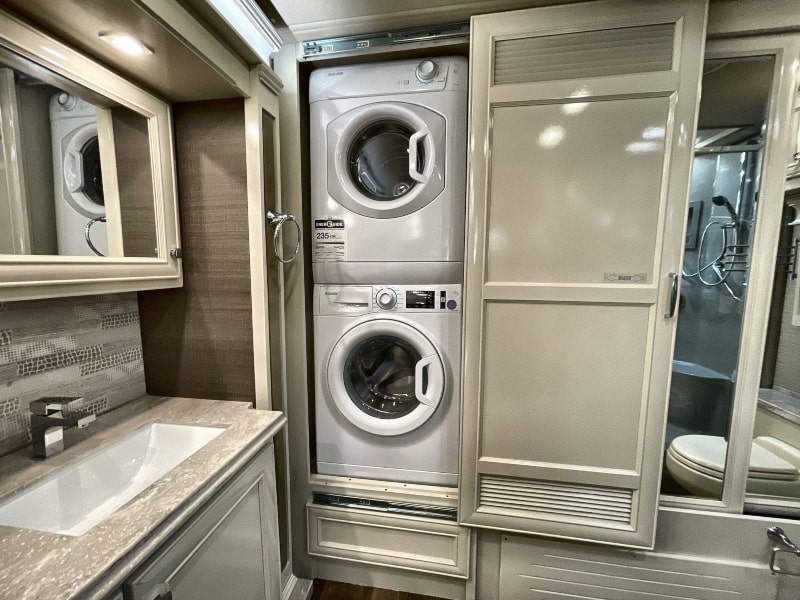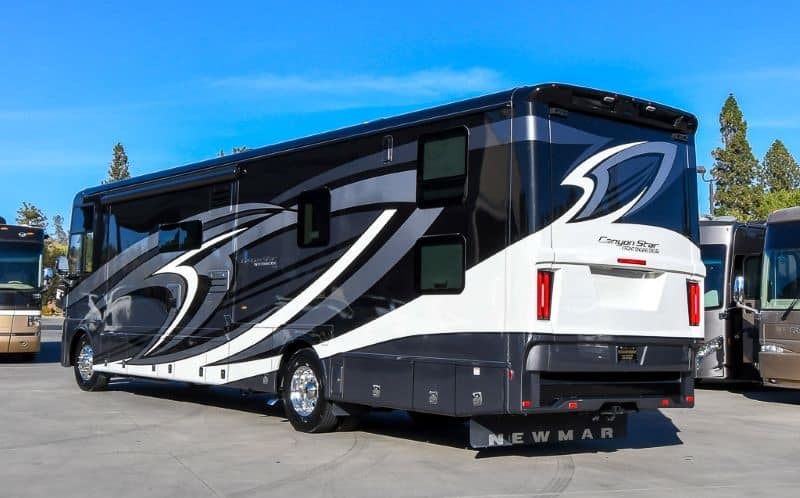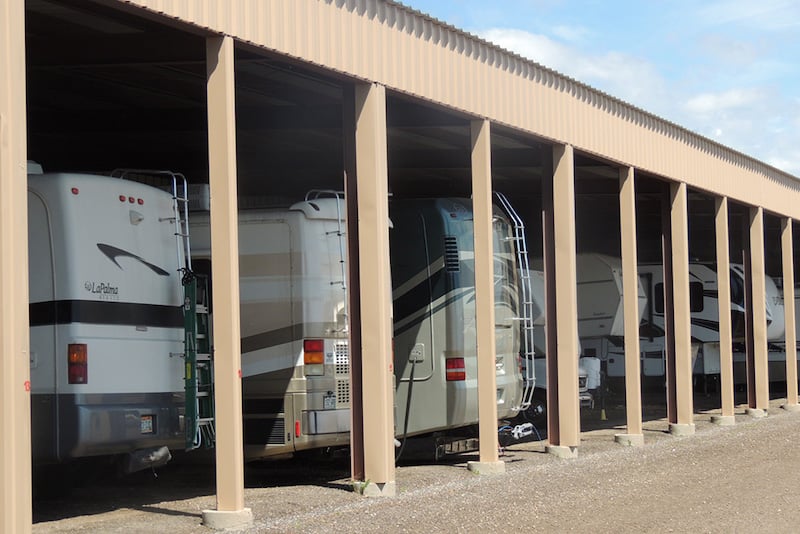You may wake up in the morning and ask, “why are my RV windows fogged up?” RV windows can fog up for several reasons.
Join us as we explore why RV windows fog up, regardless of the season. We’ll show you how this fog effect happens and what you can do about it.
What is Condensation, and How Does it Affect My RV Windows?
Condensation is the process where water vapor becomes liquified on your RV windows. The heat inside your RV transfers through the windows on a cold night. The moisture left behind condenses into fog or water droplets. The same is true on hot days when the air conditioner is running in your coach.
That liquid can be in the form of water droplets or fog, depending on the size of the water molecules. So not only will you have water on your windows, but your entire RV will also be affected by the air’s moisture.
The real problem is when the water droplets become heavy enough to drip down. Then, even with ideal weather stripping, mold, mildew, or fungal spores could be waiting for moisture.
7 Most Likely Causes of Foggy RV Windows
RV windows can fog up for several reasons. Let’s take a look at some of those causes.
1. Broken Panes

Broken panes are a possible cause of foggy RV windows. Cracks in the windows will allow air to seep in, causing foggy RV windows.
For this reason, your best bet will be to replace the window. If you can, choose double pane windows. The space between the windows will decrease the temperature difference between the outside and the inside glass. This will reduce condensation build-up.
2. Cracked or Broken Seal

Cracked or broken window seals are another source of air leaking into your motor home, causing RV windows to fog up. You can replace the old seals, which is the least expensive option. Check articles and YouTube videos for more information on replacing cracked or broken seals.
3. Activities that Cause Steam

We all know what happens when you take a long, hot shower in your bathroom. The room steams up, and you must wipe down the mirror with your towel. Activities such as cooking and laundry. Cooking outside and using the campground’s bathhouse and laundry facilities can reduce condensation build-up.
4. Propane Vapor
When propane burns, it creates water as a byproduct. Every pound of propane burned produces 1.64 gallons of water. If your furnace runs, ensure it’s adequately ventilated to reduce propane vapor.
5. High Outdoor Humidity
High outdoor humidity, whether in hot weather or cold, will affect the moisture in your RV. Running the air conditioning in hot weather will help keep your RV’s humidity at bay, at least during the summer months.
6. Other Weather Conditions
Humidity is the presence of water molecules in the air. High humidity levels are more likely in warm air because it can hold more water at a higher temperature. Warm weather and rain storms will wreak the most havoc on your RV’s indoor humidity. However, running the air conditioner should help mitigate your RV’s moisture.
7. Too Many People in the RV
If you’ve ever attended an event in a large room, if you’re early, you know that the room starts cold. As people fill in, the room warms up because all the people participate. The same effect happens in your motorhome. To counteract your RV windows from fogging up, you may want to turn on your vent fans or adjust your A/C.
Are Double or Single Pane Windows More likely to Fog Up?
Double pane windows are all around better insulators than single pane. The space between the windows helps to decrease the temperature difference between the outside and the inside glass, thus helping to reduce condensation build-up.
However, double-pane windows can fog up between the pane and cause a pain in your wallet to fix. A broken seal probably causes this. Use a steam iron on the lowest setting to defog the window as a temporary fix.
Move the iron over the fogged area for 5-10 minutes. Keep the iron moving to keep it from staying too long in one spot. You can also put a paper towel between the iron and the window.
Why Can Window Condensation Be a Bad Thing?
Yes, window condensation isn’t a good thing for your RV. Any moisture in your RV can cause mold or mildew that will lead to odors, allergies, and other serious health problems.
Mold-infested materials must be removed, replaced, or cleaned by a professional. The best way to avoid mold is to prevent water damage before it starts.
Excessive moisture can also cause delamination of walls, ceilings, and other surfaces. When this happens, the adhesive that bonds those surfaces together breaks down. The adhesion then begins pulling away.
Moisture left untreated can also lead to rot, which will keep you off the road and an expensive to repair. For example, if you have soft spots on the ceiling and floor, you may have rot beginning in your RV.
How Do Foggy Windows Affect the Interior Comfort of your RV?
You want a warm, dry living space. Foggy windows only happen with some humidity inside your motorhome. Just like sitting outside on a hot and muggy day is uncomfortable, so is living in a hot or cold, humid environment. You want the best atmosphere possible for living, sleeping, and working in your RV.
Read on for ways to prevent foggy RV windows and to keep that feeling of comfort in your RV living space.
5 Ways on How to Prevent Foggy RV Windows
1. Run a Dehumidifier
A good dehumidifier doesn’t cost much and will make a lot of difference in keeping the moisture down in your RV. Be sure and empty it frequently and keep your shades up to prevent water from being trapped between the shades and the window.
2. Increase Ventilation
Increasing ventilation will go a long way toward winning the condensation battle. Fans and windows allow you to circulate air more efficiently, particularly when cooking or showering. Take note of the difference between showering with and without a bathroom fan running.
3. Use Proper Weather Stripping and Maintain Your Windows
Good weather stripping and maintaining your windows will save money in the long run in repair costs. You won’t have to replace expensive items such as a moldy mattress or, even worse, a ceiling that has begun to rot.
Replacing weather stripping isn’t too expensive, and many companies have pre-cut length packages specific to your motorhome’s make and model.
4. Replace Broken Windows
It would be best if you replaced the broken window as soon as possible. Any breach in your RV’s shell, window, or seal, allows moisture to enter, letting rot and mold take hold. The quicker you get this taken care of, the longer your motor coach will last, saving your repair costs.
5. Run Exhaust Fans
Run your exhaust fan every time you shower and cook. Other exhaust fans can be used periodically to help ventilate and circulate air. Running your air conditioner can dispose of the interior humidity if you’re in a humid environment.
Can you Fix Foggy RV Windows?
Foggy RV windows are a pain (no pun intended, but keeping the moisture at bay is essential. The best defense in our RV was to purchase a good dehumidifier, open the blinds and run the air conditioner in the summer. Sometimes had some condensation mess, but it never became an issue when we stayed on top of the problem.
When to Replace Your RV Windows
RV windows should last between 15 and 30 years, depending on the materials used, weather conditions, installation, etc. You should replace any damaged, drafty or broken windows as soon as possible.
If you have difficulty opening your windows, you might consider having the problem fixed or replacing the windows. If your windows can’t be closed properly, this is also a sign that they need to be replaced.
Final Thoughts on Why your RV Windows Fog Up
You live in an RV, and you breathe. Your windows are going to fog up and create condensation. If you keep your windows in good condition, keep up with any repairs and follow the instructions to keep your windows from fogging up, you shouldn’t need to worry about excessive moisture in your RV. A good dehumidifier will go a long way to keep your RV warm, dry, and comfortable all year.
About the Author:
Terri Nighswonger and her husband Todd have been RVing and work camping for five years with their Cavalier King Charles Spaniel, Newton, and their Minnie Australian Shepherd, Remi.
They originate from the Midwest but plan to enjoy the West for a few years, wintering in Arizona and summering wherever the road may lead. Writing is Terri’s passion, but she also loves hiking, kayaking, walking her dogs, and anything she can do outdoors.




